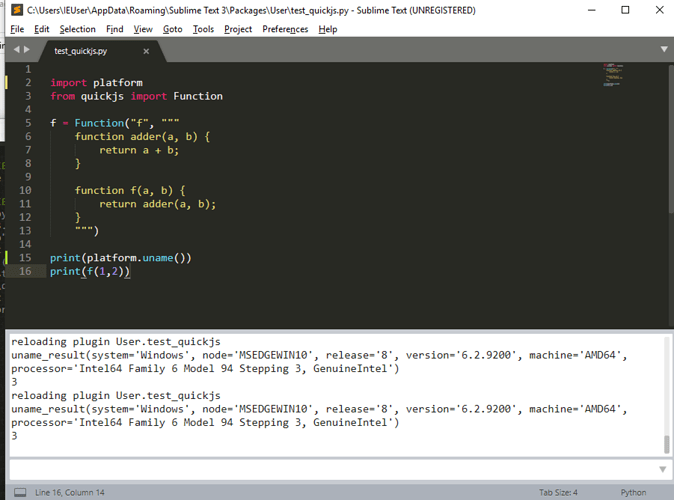I’m building a new Emmet package for ST3 editor. In next version, I plan to use a small QuickJS module for running JS code in Python (https://github.com/PetterS/quickjs) instead of heavy PyV8.
So far I was able to successfully compile and run in on macOS and Win x32. But when I’m trying to use the same GCC compilation environment for x64 (MinGW-w64, gcc 8.1.0, POSIX threads, Python 3.3.5), plugin_host constantly crashes. After playing with compiler options, I think that it’s one of the standard MinGW libs cause crashes (libpthread? libgcc?): if I compile module without static links, ST simply throws default Python error with failed DLL load, but after I modify PATH env variable to point to MinGW DLLs, it’s just crashes.
My testing environment:
Sublime Text 3 v3.2.2
32 bit: Windows 7 (x32, from http://modern.ie/), MinGW 8.1.0, POSIX thread, Python 3.3.5: works fine
64 bit: Windows 10 (x64, from http://modern.ie/), MinGW 8.1.0 (also tried 4.9), POSIX thread (also tries win32 thread), Python 3.3.5: crash
macOS: 10.14 and 10.15, works fine
Is there any details about environment I should use to compile Python modules for Win10 x64?

 any details about upcoming changes (maybe in private)? I use most of ST api heavily in new plugin (phantoms, popups, marked regions, event listeners etc.), it will be a pity if it’s not necessary.
any details about upcoming changes (maybe in private)? I use most of ST api heavily in new plugin (phantoms, popups, marked regions, event listeners etc.), it will be a pity if it’s not necessary.